In exploring the illustrious career of Keanu Reeves, we delve into a filmography that spans a remarkable range of genres, characters, and iconic moments that have left an indelible mark on Hollywood and its audiences.
Known for his versatility, depth, and the physicality he brings to his roles, Reeves has become a staple in the cinematic world, navigating from action-packed thrillers to profound dramas with seamless finesse.
This article embarks on a journey through his top 10 movies, showcasing the breadth of his talent and the unique presence he carries on screen. From the cyberpunk realms of “The Matrix” to the gritty underworld of “John Wick,” Reeves’ performances are imbued with a compelling blend of intensity, vulnerability, and charisma.
Beyond his on-screen prowess, Reeves is celebrated for his off-screen persona—marked by humility and generosity—further cementing his status as one of Hollywood’s most beloved figures.
As we delve into his most significant works, we uncover the impact of Keanu Reeves’ enduring legacy on cinema and popular culture, highlighting his evolution as an actor and his profound influence on the industry.

Keanu Reeves’s top 10 movies, which will serve as the foundation for our exploration:
- The Matrix (1999)
- John Wick (2014)
- Speed (1994)
- Point Break (1991)
- The Devil’s Advocate (1997)
- Constantine (2005)
- Bill & Ted’s Excellent Adventure (1989)
- A Scanner Darkly (2006)
- My Own Private Idaho (1991)
- John Wick: Chapter 2 (2017)
This selection showcases the diversity of Keanu Reeves’ career, featuring everything from groundbreaking science fiction to high-octane action, and poignant drama. Each movie has contributed to his status as a beloved figure in cinema, offering audiences a glimpse into his evolution as an actor over the years. “The Matrix” (1999), is the first top movie from our list.
1. The Matrix (1999)
In 1999, the Wachowskis unleashed “The Matrix” upon the world, a film that would become a defining moment in science fiction and action cinema. Starring Keanu Reeves as Neo, a computer hacker who discovers that humanity is living in a simulated reality controlled by sentient machines, the film blends cyberpunk aesthetics with philosophical inquiries into reality, freedom, and destiny. Reeves’ performance as Neo is both iconic and transformative, marking a pivotal point in his career.
“The Matrix” is renowned for its innovative visual effects, including the famous “bullet time” technique that allows time to appear to slow down during action sequences.
These effects, combined with the film’s intricate storyline and philosophical underpinnings, created a cinematic experience that was both visually stunning and intellectually stimulating. Keanu Reeves’ portrayal of Neo is central to the film’s impact; his journey from disillusioned office worker to “The One” is compelling and nuanced, capturing the audience’s imagination.
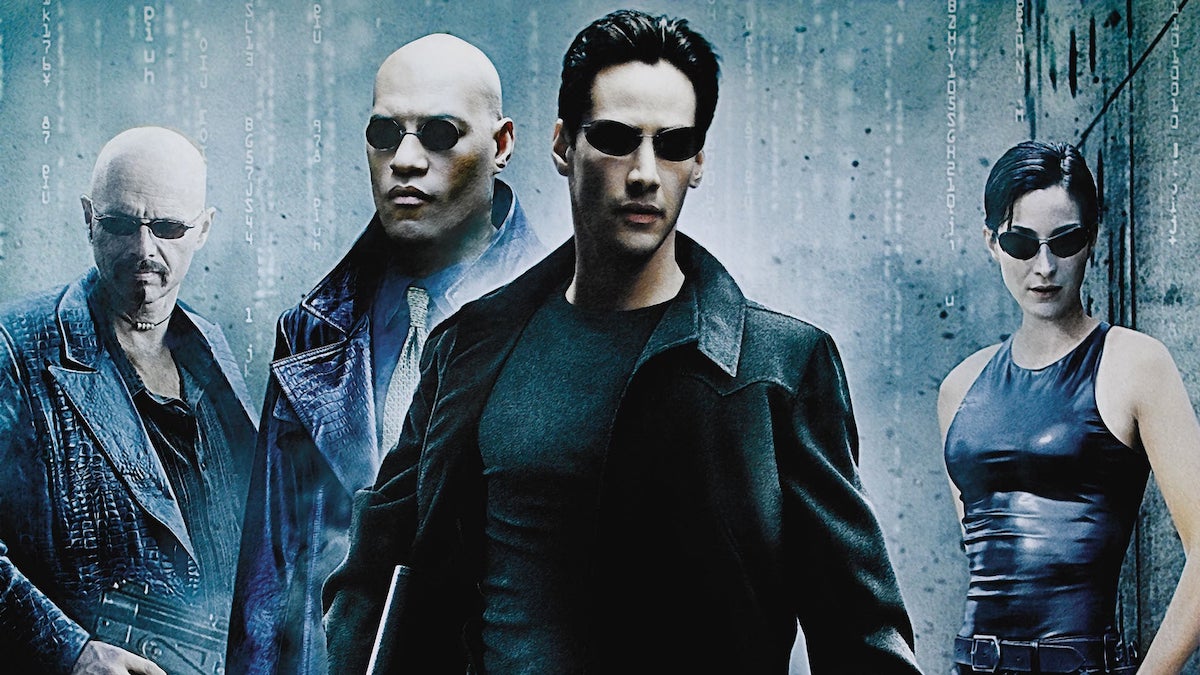
Reeves’ physical commitment to the role, undergoing months of martial arts training, added a layer of authenticity to the fight scenes, setting a new standard for action sequences in cinema. His performance, characterized by a blend of intensity and vulnerability, made Neo a relatable and inspirational figure. “The Matrix” not only showcased Reeves’ ability to lead a blockbuster franchise but also cemented his place as a versatile actor capable of handling complex roles.
The cultural impact of “The Matrix” is immense, influencing not only the film industry with its technological innovations and narrative structure but also impacting fashion, philosophy, and popular culture. Its exploration of themes such as the nature of reality, freedom, and the use of technology has remained relevant, prompting audiences and critics alike to revisit and discuss the film’s significance and its predictions.

“The Matrix” received critical acclaim upon its release, winning four Academy Awards and becoming a box office success. It spawned a franchise that includes sequels, a series of animated shorts (“The Animatrix”), and numerous video games, contributing to its enduring legacy. The film’s combination of groundbreaking visual effects, a thought-provoking storyline, and Keanu Reeves’ standout performance makes it not only a highlight of his career but also a landmark in the science fiction genre.
2. John Wick (2014)
Released in 2014, “John Wick” marks a pivotal moment in Keanu Reeves’ career, redefining him as one of the most formidable action stars of his generation. Directed by Chad Stahelski and David Leitch, the film introduces audiences to John Wick, a retired hitman drawn back into the world of organized crime following the tragic death of his wife and the subsequent killing of his dog, a final gift from her. The movie quickly established itself as a cult classic, admired for its straightforward narrative, stylish execution, and breathtaking action sequences.
“John Wick” is distinguished by its unique approach to action choreography. The film’s directors, both of whom have backgrounds in stunt coordination, implemented a shooting style known as “gun-fu,” a blend of martial arts and gunplay that emphasizes fluid motion and practical effects.
Keanu Reeves’ dedication to performing his stunts added a layer of authenticity to the action scenes, showcasing his remarkable physicality and commitment to the role. This dedication required Reeves to undergo extensive training in judo, jiu-jitsu, and marksmanship, resulting in fight sequences that are both realistic and exhilarating.
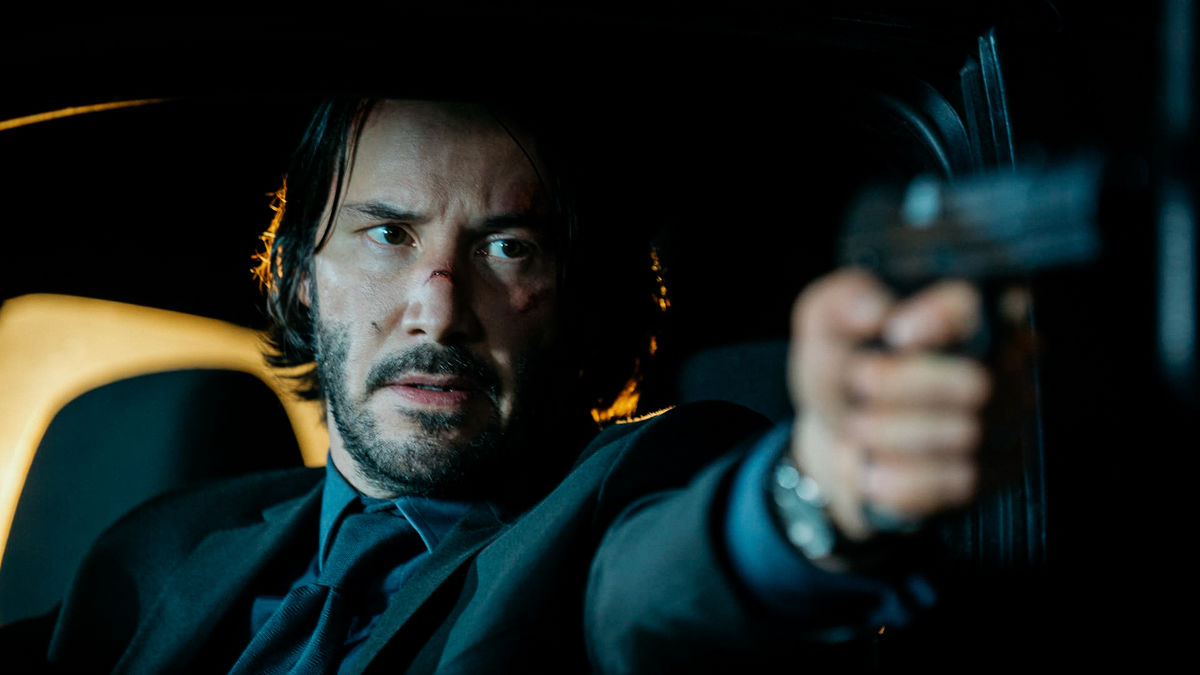
The narrative of “John Wick” is deceptively simple, focusing on themes of revenge, grief, and redemption. However, it’s the depth of the world-building that sets the film apart. The introduction of The Continental, a hotel that serves as neutral ground for criminals, along with a detailed underworld economy based on gold coins, offers a glimpse into a richly imagined universe. This backdrop adds layers to the storyline, making the action feel grounded within a broader, intriguing context.
Reeves’ portrayal of John Wick is both nuanced and powerful. He brings a sense of weary gravitas to the character, embodying a man who is simultaneously grieving and lethal. This performance revitalized his career, reminding audiences and critics alike of his ability to carry a film both emotionally and physically. The success of “John Wick” led to the creation of a franchise, with sequels that delve deeper into the mythology of its universe and the character’s past, solidifying John Wick as one of the most iconic characters in action cinema.
Critically acclaimed for its innovative action sequences, compelling world-building, and Reeves’ standout performance, “John Wick” has had a significant impact on the action genre. It has influenced the aesthetics and choreography of subsequent action films, pushing the genre towards a preference for practical effects and long takes over rapid editing and CGI. The film’s success at the box office and among critics underscores the audience’s appetite for well-crafted action movies that balance visual spectacle with character depth.

“John Wick” represents a high point in Keanu Reeves’ career, showcasing his enduring appeal and versatility as an actor. The film not only reignited interest in action movies but also established a new standard for the genre, combining breathtaking choreography with a compelling narrative and rich world-building. It stands as a testament to Reeves’ ability to continuously reinvent himself and remain relevant in the ever-changing landscape of Hollywood.
3. Speed (1994)
“Speed,” directed by Jan de Bont in 1994, is a high-octane action thriller that not only catapulted Keanu Reeves into the realm of action heroes but also redefined the genre for the 90s. In this gripping film, Reeves stars as Jack Traven, a young Los Angeles police officer who finds himself pitted against a vengeful bomber, played by Dennis Hopper.
The bomber rigs a city bus to explode if its speed drops below 50 miles per hour, setting the stage for a tense and relentless chase through the city. “Speed” is celebrated for its relentless pace, innovative premise, and the chemistry between its leads, including Sandra Bullock, who plays Annie, a passenger who becomes an impromptu bus driver.
The film stands out for its clever use of a high-stakes scenario to maintain tension and drive the narrative forward. Unlike other action films of its era that relied heavily on gunfights and explosions, “Speed” uses its unique premise to create suspense and excitement. The simplicity of the plot – a bus that can’t slow down – belies the film’s ingenuity in sustaining audience interest and tension throughout its runtime.
Keanu Reeves’ performance as Jack Traven is a key element of the film’s success. His portrayal of the determined and resourceful police officer showcased a different kind of action hero – one who relies on wit and determination as much as physical strength.
This role demonstrated Reeves’ ability to lead a blockbuster film and solidified his status as a versatile actor capable of carrying both action sequences and dramatic moments. His chemistry with Sandra Bullock added a human element to the high-stakes thriller, providing moments of levity and romance amidst the chaos.
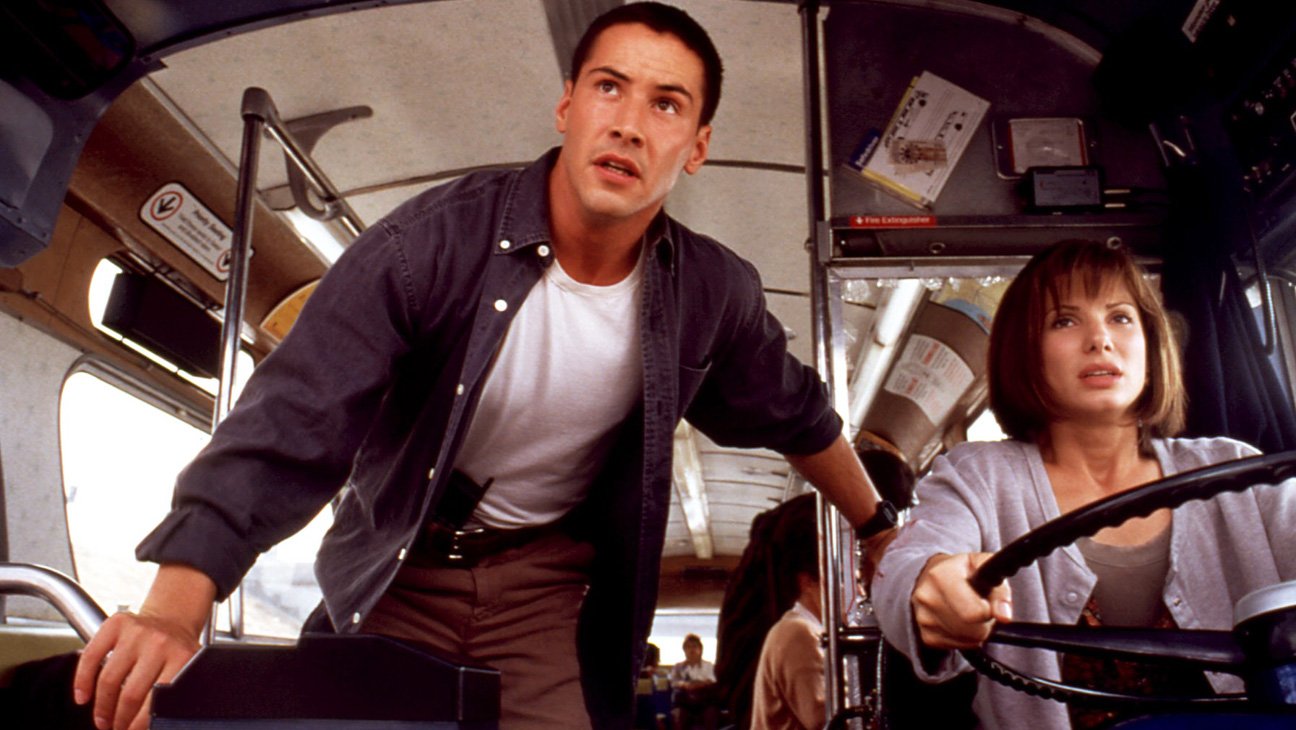
“Speed” was a critical and commercial success, praised for its direction, editing, and performances, particularly that of Reeves and Bullock. The film’s innovative action sequences, including the now-iconic jump of the bus over an incomplete freeway, were achieved through practical effects, adding to the suspense and realism of the movie. These scenes set a new standard for action sequences, influencing future films in the genre.
Beyond its immediate impact, “Speed” has endured as a classic of action cinema, remembered for its tight pacing, memorable performances, and innovative premise. The film earned two Academy Awards for Best Sound Editing and Best Sound Mixing, underscoring its technical achievements. It also launched Sandra Bullock into stardom and helped redefine Keanu Reeves as a leading man capable of anchoring high-action thrillers.
“Speed’s” legacy extends beyond its box office success and critical acclaim; it influenced a generation of action films that followed, emphasizing clever premises and character-driven narratives over sheer spectacle. The film remains a touchstone for action enthusiasts and is often cited as one of the best action movies of the 90s.

The success of “Speed” also highlighted Keanu Reeves’ versatility as an actor, demonstrating his ability to transition from the philosophical musings of earlier roles to the physical demands of action stardom. It marked an important phase in Reeves’ career, showcasing his potential as a leading action hero and paving the way for future roles in blockbuster hits.
4. Point Break (1991)
“Point Break,” directed by Kathryn Bigelow in 1991, is a cult classic that blends action, crime, and surfing into a thrilling cinematic experience. Starring Keanu Reeves as Johnny Utah, a young FBI agent, and Patrick Swayze as Bodhi, the charismatic leader of a group of bank-robbing surfers, the film explores themes of friendship, loyalty, and the search for the ultimate thrill. “Point Break” stands out for its breathtaking action sequences, deep emotional undercurrents, and the compelling dynamic between its lead characters.
Keanu Reeves’ portrayal of Johnny Utah marked a significant step in his evolution as an action star. His character, an Ohio-born former football star turned FBI agent, dives undercover into the surfing community to catch the “Ex-Presidents,” a gang of bank robbers who wear masks of former U.S. Presidents during their heists.
Reeves’ performance balances the physical demands of the action scenes with the emotional depth required for his character’s complex journey. The role required Reeves to undergo extensive surf training, adding authenticity to his portrayal and demonstrating his commitment to the physicality of his roles.
The film is renowned for its action sequences, which include skydiving, surfing, and foot chases, all of which set new standards for the action genre. These scenes are not only technically impressive but also serve to deepen the narrative, symbolizing the characters’ quest for freedom and transcendence. The surfing scenes, in particular, capture the spiritual connection the characters feel with the ocean, adding a layer of philosophical depth to the film.
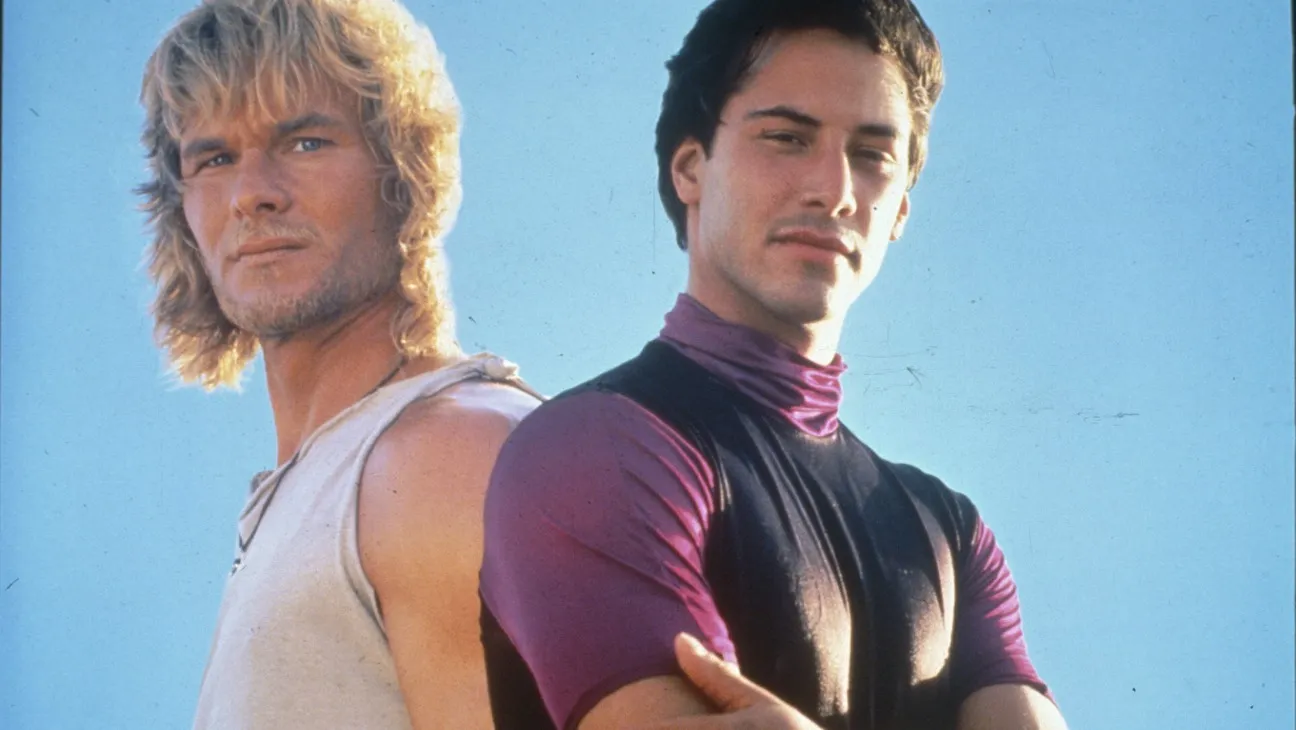
The relationship between Johnny Utah and Bodhi is central to “Point Break,” with Reeves and Swayze delivering performances that convey a deep, albeit complicated, friendship. Their dynamic drives the narrative, exploring themes of respect, admiration, and the moral ambiguity of their respective paths. This emotional core adds a layer of complexity to the film, elevating it above standard action fare and into the realm of psychological drama.
“Point Break” received a mixed critical reception upon its release but has since been re-evaluated as a seminal work in the action genre and a key film in Kathryn Bigelow’s directorial career. Its influence can be seen in the portrayal of extreme sports in cinema and its approach to action sequences that prioritize practical effects and stunt work over CGI. The film’s depiction of the surf culture and its exploration of the adrenaline-fueled pursuits that define the human experience have also contributed to its enduring appeal.
In addition to its cultural impact, “Point Break” played a significant role in Keanu Reeves’ career, showcasing his ability to anchor a film with both physical intensity and emotional depth. The film solidified his status as a versatile actor capable of moving between genres and delivering performances that resonate with audiences on multiple levels.

“Point Break” remains a beloved classic, celebrated for its exhilarating action sequences, compelling character dynamics, and philosophical underpinnings. It stands as a testament to the power of cinema to explore the complexities of human relationships and the eternal quest for meaning beyond the confines of ordinary life.
5. The Devil’s Advocate (1997)
“The Devil’s Advocate,” directed by Taylor Hackford in 1997, is a supernatural thriller that delves into themes of morality, ambition, and the nature of evil. Keanu Reeves stars as Kevin Lomax, a talented and ambitious young lawyer from Florida who has never lost a case.
His prowess in the courtroom catches the attention of John Milton (played by Al Pacino), the charismatic and enigmatic senior partner of a high-powered New York law firm. As Kevin is lured into Milton’s world, he finds his life and soul in jeopardy, uncovering a sinister truth that challenges his ethical boundaries and forces him to confront the very essence of good and evil.
Reeves’ performance as Kevin Lomax is a departure from the action roles that defined much of his career during the 1990s. In “The Devil’s Advocate,” Reeves portrays a complex character whose insatiable ambition leads him down a dark path.
His nuanced performance captures the internal conflict of a man torn between his desire for success and the moral compromises required to achieve it. The film explores the corrupting influence of power and the consequences of losing one’s moral compass, themes that resonate deeply in Reeves’ portrayal.
Al Pacino’s role as John Milton provides a compelling counterpoint to Reeves’ character, embodying the film’s exploration of temptation and moral decay. The dynamic between Reeves and Pacino is central to the film’s narrative tension, with Pacino delivering a masterclass in charismatic malevolence.
The interplay between their characters adds depth to the film’s examination of good versus evil, making “The Devil’s Advocate” a compelling psychological drama as much as it is a supernatural thriller.
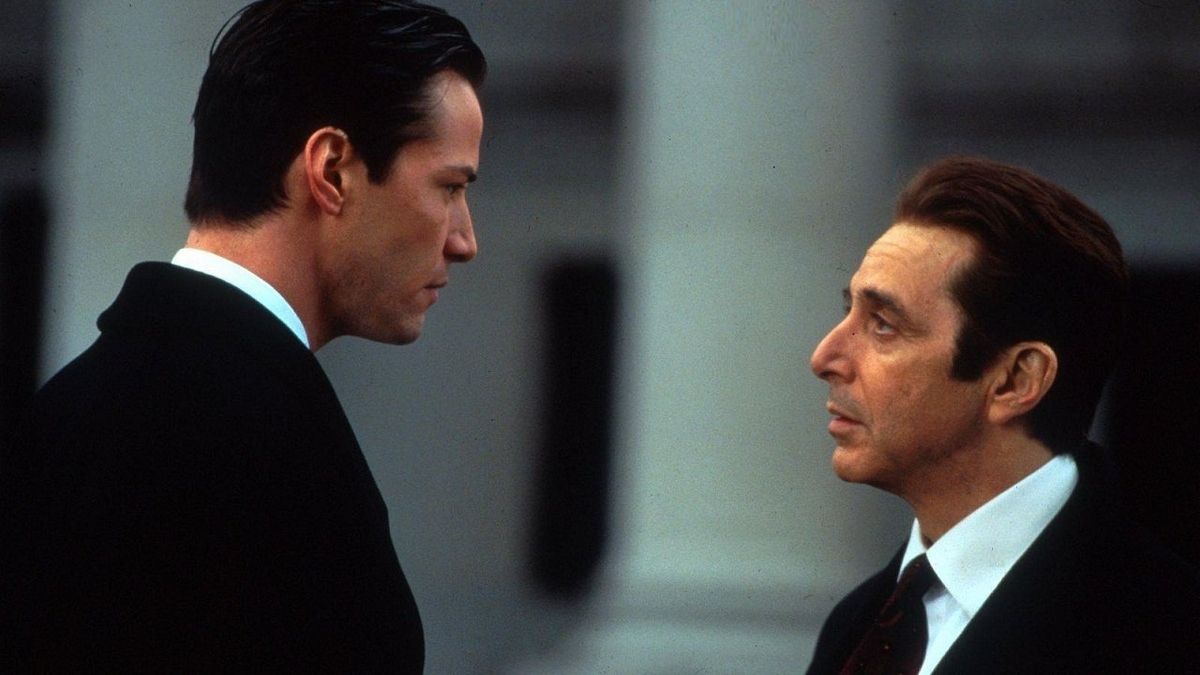
The film’s visual style and direction contribute to its unsettling atmosphere, blending elements of horror and drama to create a unique cinematic experience. The screenplay, based on Andrew Neiderman’s novel of the same name, weaves legal drama with supernatural elements, creating a narrative that keeps audiences engaged and guessing until the end.
The special effects, particularly those depicting hellish visions and demonic transformations, enhance the film’s exploration of the supernatural while grounding these elements in the characters’ psychological experiences.
“The Devil’s Advocate” was met with mixed reviews upon its release, with critics praising the performances of Reeves and Pacino but offering varied opinions on its execution and thematic depth.
Over time, however, the film has garnered a cult following, appreciated for its ambitious storytelling, compelling performances, and the philosophical questions it raises about ambition, morality, and the human condition.
In addition to its narrative and thematic elements, “The Devil’s Advocate” marks an important point in Keanu Reeves’ career, showcasing his range as an actor and his ability to navigate complex characters and genres. The film’s exploration of the darker aspects of human nature and the moral dilemmas faced by its characters offer a rich canvas for Reeves’ performance, further establishing him as a versatile and compelling presence in the film industry.

“The Devil’s Advocate” remains a thought-provoking and visually striking film that challenges viewers to reflect on their values and the choices they make in the pursuit of success. It stands out in Keanu Reeves’ filmography as a testament to his ability to engage with complex material and deliver performances that resonate with audiences on a profound level.
6. Constantine (2005)
“Constantine,” directed by Francis Lawrence in 2005, marks a significant entry in Keanu Reeves’ filmography, showcasing his foray into the supernatural thriller genre. In this adaptation of the “Hellblazer” comic book series, Reeves portrays John Constantine, a tormented demon hunter who patrols the boundary between heaven and hell, seeking redemption for his soul by sending demons back to the depths from which they came. The film blends elements of horror, action, and detective noir, creating a unique cinematic experience that explores themes of redemption, faith, and the eternal battle between good and evil.
Reeves’ portrayal of John Constantine is characterized by a weary cynicism and a deep-seated sense of guilt, attributes that add depth to the action-packed narrative. His performance captures the essence of a man burdened by his ability to perceive the true nature of the world beyond the human facade, struggling with his salvation while combating the forces of darkness. The role required Reeves to embody a character whose toughness is matched by his existential angst, offering a different dimension to the actor’s repertoire.
“Constantine” is notable for its visual style, employing dark, atmospheric cinematography and special effects to bring its supernatural world to life. The film’s depiction of hell, as a parallel dimension overlaying our own, is particularly striking, using a blend of CGI and practical effects to create a vividly dystopian vision. This visual approach enhances the film’s exploration of its theological themes, providing a stark backdrop for the narrative’s moral conflicts.
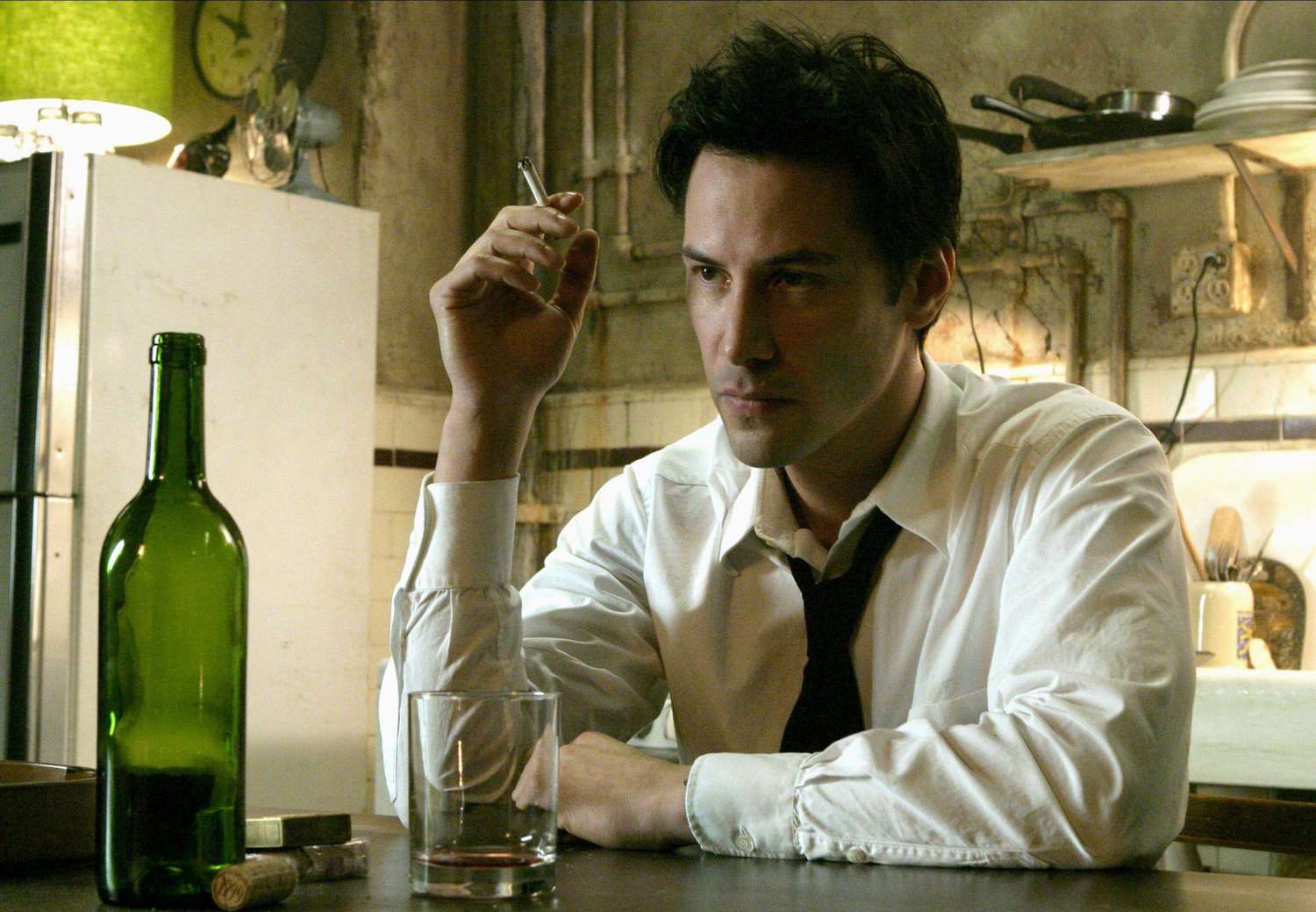
The supporting cast, including Rachel Weisz as Angela Dodson, a police detective investigating her twin sister’s mysterious death, adds emotional weight to the story. The dynamic between Reeves and Weisz’s characters enriches the plot, incorporating elements of mystery and a shared quest for truth.
The film’s antagonist, portrayed by Tilda Swinton as the androgynous angel Gabriel and Peter Stormare as Lucifer, further elevates the narrative, offering compelling interpretations of biblical figures within the story’s modern setting.
Upon its release, “Constantine” received mixed reviews, with some critics praising its ambitious vision and Reeves’ performance, while others critiqued its departure from the source material and complex plot.
Despite this, the film has garnered a dedicated fan base, appreciated for its unique blend of genres, thematic depth, and visual aesthetics. It stands as a cult favorite among fans of supernatural cinema and comic book adaptations, with particular acclaim for its inventive portrayal of the occult and the ethereal.
The film contributed to the ongoing discussion about faith, free will, and redemption in popular culture, themes that resonate with audiences on a personal level. “Constantine” also highlighted Keanu Reeves’ ability to anchor a film that straddles multiple genres, reaffirming his status as a versatile actor capable of bringing complex characters to life. His portrayal of John Constantine added a memorable character to his body of work, one that stands out for its brooding intensity and moral complexity.

“Constantine” remains a distinctive and ambitious film within the supernatural thriller genre, offering a thought-provoking narrative that questions the nature of redemption and the cost of salvation. It showcases Keanu Reeves’ talents in a role that demands both physicality and a nuanced emotional performance, further cementing his place as one of Hollywood’s most versatile actors.
7. Bill & Ted’s Excellent Adventure (1989)
“Bill & Ted’s Excellent Adventure,” directed by Stephen Herek in 1989, is a seminal film in Keanu Reeves’ career that showcases a completely different facet of his acting repertoire. In this science fiction comedy, Reeves plays Ted “Theodore” Logan, one half of a lovably dim-witted teenage duo alongside Alex Winter’s Bill S. Preston, Esq.
The film follows their zany adventures through time as they gather historical figures for their high school history presentation, a quest critical to ensuring the utopian future where their band’s music is the foundation of universal peace. The movie blends humor, history, and heart in a unique narrative that has endeared it to audiences for decades.
Keanu Reeves’ portrayal of Ted Logan is a departure from the intense, action-oriented roles that would later define much of his career. His comedic timing, paired with a genuine sense of innocence and camaraderie with Winter’s Bill, creates a character that is both endearing and hilariously clueless.
This role displayed Reeves’ versatility as an actor, capable of leading a film with a lighter, comedic presence without losing the charisma that would make him a star in more serious roles.
“Bill & Ted’s Excellent Adventure” is celebrated for its original approach to the science fiction and comedy genres, cleverly using the time travel plot device to explore historical vignettes with a humorous twist.
The dynamic between Bill and Ted as they interact with figures like Socrates, Joan of Arc, and Abraham Lincoln, among others, provides not only comedy but also a playful commentary on the importance of understanding history and its impact on the present.
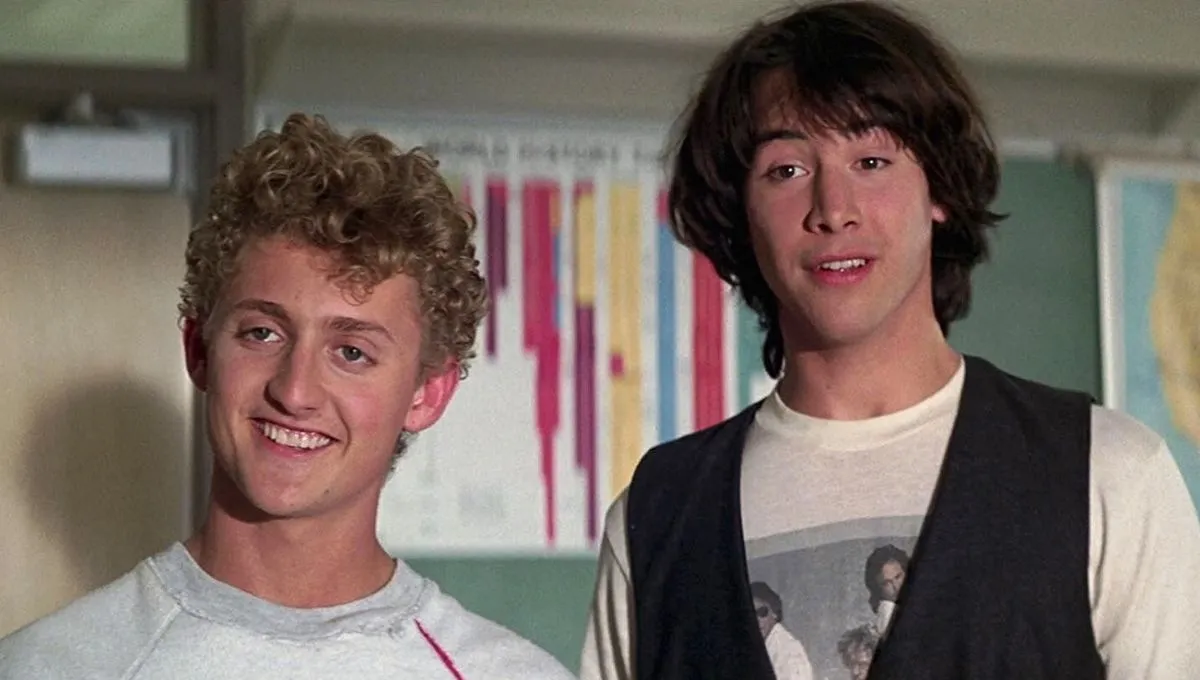
The film’s cultural impact is significant, introducing phrases like “Excellent!” and “Be excellent to each other” into the popular lexicon, embodying the movie’s overarching message of positivity and unity. Its success spawned a franchise, including sequels, animated series, and video games, cementing Bill and Ted as iconic characters in American cinema.
Critically, “Bill & Ted’s Excellent Adventure” received a mixed reception upon its release, with some dismissing it as frivolous while others praised its inventive story and charm. Over time, however, it has gained a cult following, appreciated for its earnestness, imaginative storytelling, and the chemistry between its leads. The film’s appeal lies in its ability to balance humor with a genuine message of hope and friendship, qualities that have allowed it to endure as a beloved classic.
In the context of Keanu Reeves’ career, “Bill & Ted’s Excellent Adventure” represents an early highlight, showcasing his adaptability as an actor and his ability to connect with audiences across different genres. The film highlighted his comedic talents and contributed to his growing popularity, setting the stage for the diverse roles he would tackle in the years to come.

“Bill & Ted’s Excellent Adventure” remains a testament to the enduring appeal of optimistic, light-hearted storytelling. Its legacy is a reminder of the power of cinema to bring joy and inspire kindness, showcasing Keanu Reeves’ role in creating a film that continues to be excellent to audiences, generation after generation.
8. A Scanner Darkly (2006)
“A Scanner Darkly,” directed by Richard Linklater in 2006, stands out as one of the most unique entries in Keanu Reeves’ filmography, both for its innovative animation technique and its profound exploration of surveillance, identity, and addiction.
Based on Philip K. Dick’s novel of the same name, the film is set in a near-future America where the war on drugs has led to widespread surveillance and the erosion of personal freedom. Reeves stars as Bob Arctor, an undercover agent who becomes caught in a spiral of paranoia and disconnection as he investigates a group of drug users, including himself, leading to a crisis of identity.
The film employs a technique called rotoscoping, in which live-action footage is traced over to produce animated sequences. This method creates a surreal, fluid aesthetic that perfectly complements the story’s themes of reality and illusion.
Reeves’ performance, captured and then animated, conveys a deep sense of detachment and confusion, mirroring his character’s struggle with the drug Substance D, which splits the user’s brain into two competing entities. His portrayal is both haunting and sympathetic, capturing the essence of a man losing his grasp on who he is.
“A Scanner Darkly” delves into the psychological and societal impacts of drug addiction, as well as the ethical quandaries surrounding surveillance and personal freedom. The narrative is a complex web of deceit, betrayal, and loss of self, with Reeves’ character serving as the focal point through which these themes are explored.
The film’s use of rotoscoping enhances the narrative’s dream-like quality, blurring the lines between reality and perception, a technique that amplifies the story’s psychological depth.

The supporting cast, including Winona Ryder, Robert Downey Jr., Woody Harrelson, and Rory Cochrane, delivers stellar performances, each character adding layers to the film’s exploration of addiction and surveillance. Their interactions with Reeves’ character offer glimpses into the various ways individuals cope with the pressures and alienation produced by society’s ills.
Upon its release, “A Scanner Darkly” was praised for its faithful adaptation of Dick’s novel, its innovative visual style, and the performances of its cast, particularly Reeves. While not a commercial success, the film has been recognized for its critical examination of important social issues and its unique aesthetic approach. It stands as a cult classic, appreciated for its ambition and its ability to challenge audiences with its complex themes and visual storytelling.
For Keanu Reeves, “A Scanner Darkly” represents another example of his willingness to take on challenging roles that push the boundaries of conventional storytelling. His performance is a testament to his versatility as an actor and his commitment to exploring the human condition through a diverse array of cinematic experiences.

“A Scanner Darkly” remains a significant work within the science fiction genre and in Reeves’ career, showcasing the power of cinema to address profound societal issues while pushing the boundaries of traditional filmmaking. The film’s legacy is that of a thought-provoking exploration of identity, surveillance, and addiction wrapped in a visually stunning package that continues to captivate and provoke discussion among audiences.
9. My Own Private Idaho (1991)
“My Own Private Idaho,” directed by Gus Van Sant in 1991, is a poignant exploration of friendship, love, and the quest for home. This avant-garde drama stands out in Keanu Reeves’ career as a film that showcases his ability to inhabit deeply complex characters. Starring alongside River Phoenix, Reeves plays Scott Favor, the rebellious son of a wealthy family who lives a life of street hustling while rejecting his privileged background.
The narrative centers around the relationship between Scott and Mike Waters (played by Phoenix), a young man suffering from narcolepsy, as they navigate the landscapes of Portland’s streets, Idaho’s plains, and Italy’s countryside, searching for belonging and identity.
The film is notable for its blend of Shakespearean elements, particularly echoes of “Henry IV,” with the gritty reality of street life, creating a unique narrative structure that is both lyrical and stark. Reeves’ portrayal of Scott is nuanced, capturing the character’s internal conflict between his desire for freedom and the inevitable pull of his inheritance and societal expectations. His performance, alongside Phoenix’s, is central to the film’s emotional depth, exploring themes of loyalty, betrayal, and the family search.
“My Own Private Idaho” is celebrated for its bold depiction of queer themes, offering a compassionate and nuanced portrayal of its characters’ sexuality and emotional lives at a time when such representation was rare in cinema. The relationship between Scott and Mike is depicted with tenderness and complexity, challenging conventional narratives around sexuality and friendship.
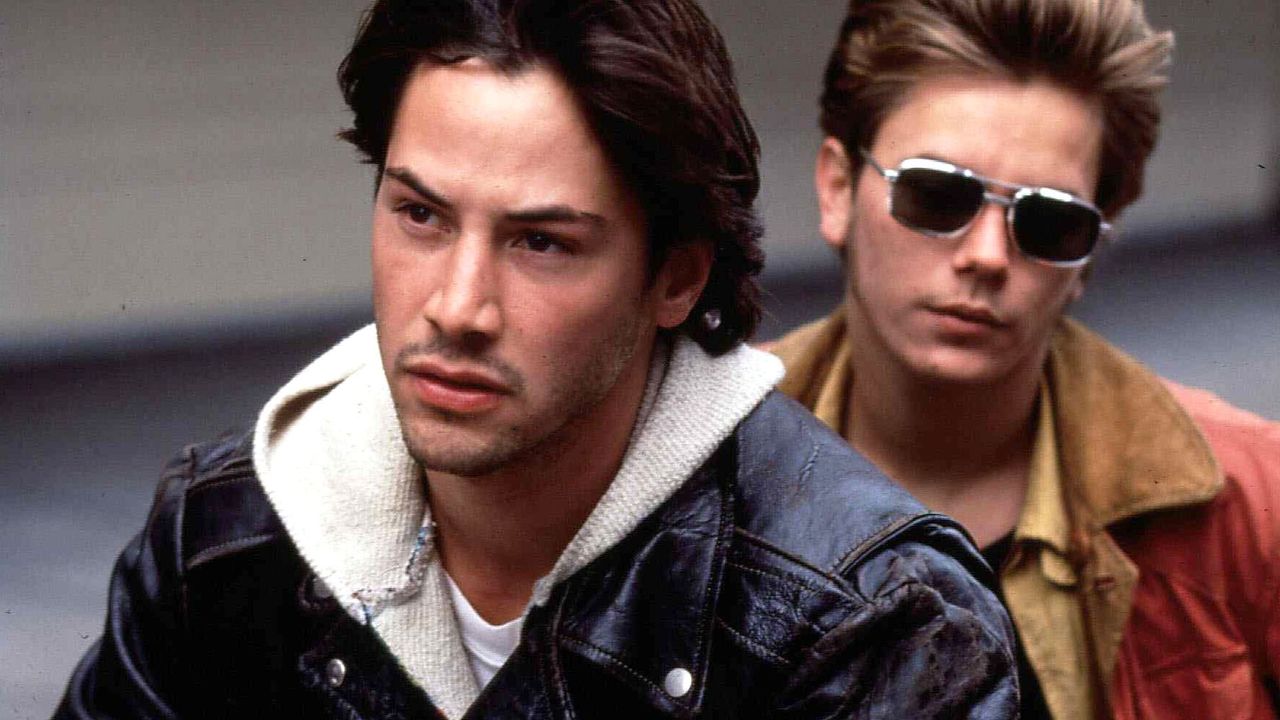
The film’s visual style, incorporating elements of road movie aesthetics, Shakespearean dialogue, and documentary-like interviews, contributes to its dreamlike quality. This approach, combined with the performances of its leads, creates a cinematic experience that is both haunting and deeply affecting. Van Sant’s direction and the screenplay, which he also wrote, have been lauded for their sensitivity and innovation, making “My Own Private Idaho” a landmark film in the New Queer Cinema movement.
Upon its release, “My Own Private Idaho” received critical acclaim for its performances, particularly Phoenix’s, its direction, and its ambitious narrative structure. The film has since been recognized as a cult classic, appreciated for its artistry, emotional depth, and exploration of themes related to identity, family, and the human need for connection.

For Keanu Reeves, the role of Scott Favor represents one of the most significant performances of his early career, demonstrating his willingness to tackle challenging and unconventional roles. The film highlights his range as an actor and his ability to engage with complex material, contributing to his reputation as a versatile and committed performer.
10. John Wick: Chapter 2 (2017)
“John Wick: Chapter 2,” directed by Chad Stahelski in 2017, builds upon the foundation laid by its predecessor to deliver an even more thrilling and visually stunning action experience. Keanu Reeves returns as the titular character, John Wick, a retired hitman forced back into the underworld he seeks to escape, this time by a blood oath that pulls him into an international assassination plot. The sequel expands the universe introduced in the first film, delving deeper into the intricacies of its criminal underworld and the codes that govern it.
Reeves’ performance in “John Wick: Chapter 2” solidifies the character as an iconic figure in modern action cinema. His portrayal of Wick combines a stoic demeanor with a palpable sense of grief and rage, offering a deeply human core to the film’s high-octane action sequences. The physical demands of the role are once again met with Reeves’ commitment to performing his stunts, showcasing his dedication to the authenticity of the character’s combat skills. This dedication pays off in the film’s meticulously choreographed fight scenes, which blend martial arts, gunplay, and vehicular action into a seamless ballet of violence.
The sequel’s narrative thrust is propelled by the concept of the blood oath, introducing new layers of loyalty and betrayal into the world of John Wick. This expansion of the lore includes the exploration of The Continental’s global presence, particularly in Rome, offering a wider lens on the series’ unique take on the assassin community. The introduction of new characters, such as the Bowery King, played by Laurence Fishburne, and the mute assassin Ares, played by Ruby Rose, enriches the film’s tapestry, providing Wick with both new allies and adversaries.
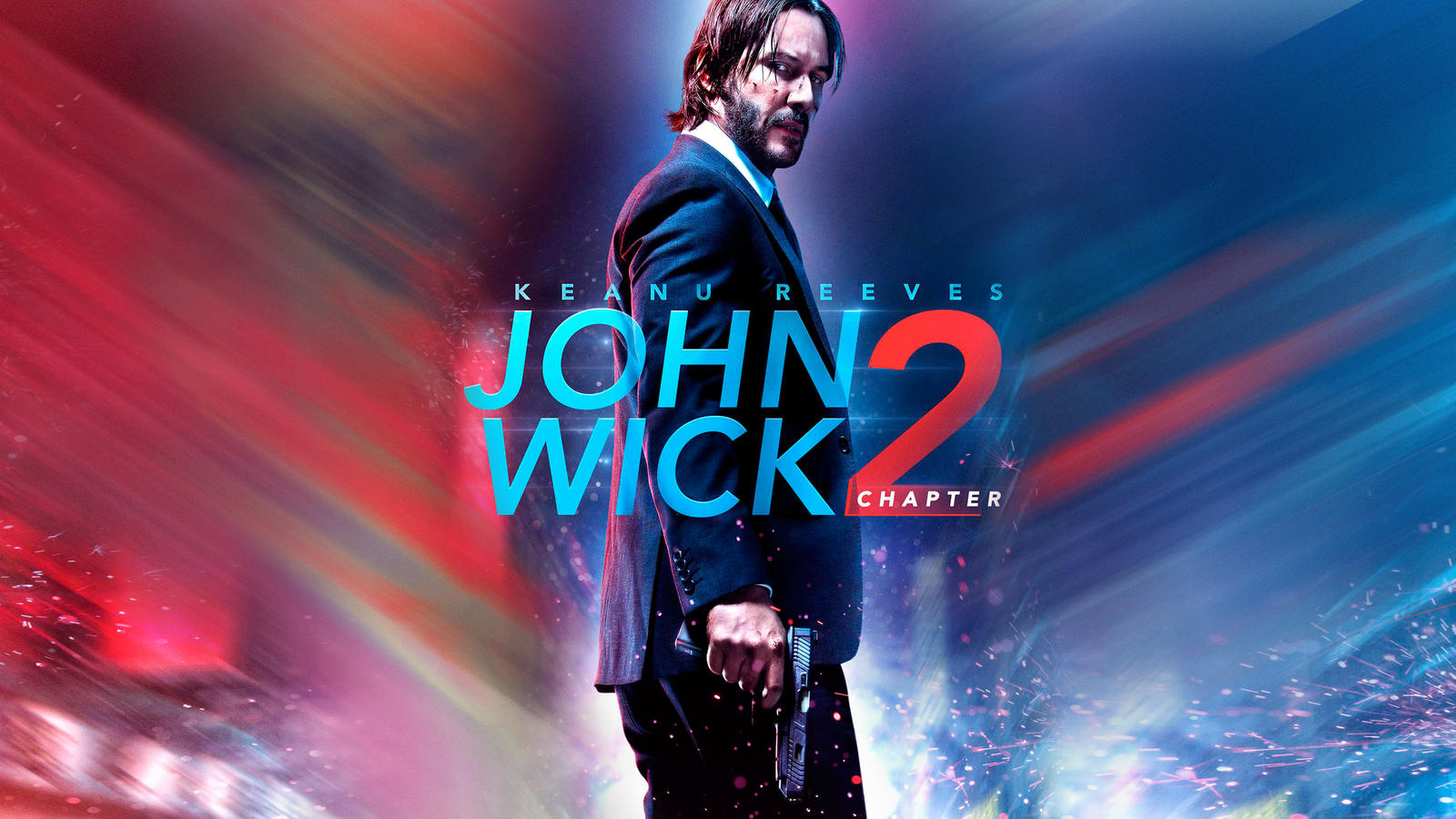
“John Wick: Chapter 2” is acclaimed for its ambitious action sequences, including a memorable sequence in the Roman catacombs and a mirrored art installation fight, each showcasing the film’s creative use of location and choreography. The cinematography and visual style, marked by neon-lit aesthetics and fluid camera work, enhance the film’s graphic novel-like quality, immersing viewers in its stylized world.
Upon release, the film received positive reviews for its action sequences, world-building, and Reeves’ performance, with many critics noting it as a superior sequel that expanded upon the original in every way. The success of “John Wick: Chapter 2” further cemented the franchise’s place in action cinema, setting the stage for subsequent entries and a growing universe of spin-offs and related media.

For Keanu Reeves, “John Wick: Chapter 2” represents a reaffirmation of his status as a leading action star, capable of anchoring a franchise with his physical prowess and emotional depth. The film underscores his ability to evolve with his characters, offering audiences a portrayal that is both iconic and refreshingly complex.
Conclusion:
Keanu Reeves’ filmography is a testament to an actor who has continuously evolved, seamlessly moving between genres and embracing both commercial blockbusters and independent films. His commitment to his roles, evident in his rigorous preparation and willingness to perform his stunts, adds a layer of authenticity to his performances that audiences find compelling.
Furthermore, Reeves’ off-screen persona—marked by humility, generosity, and a down-to-earth nature—has endeared him to fans and colleagues alike, enhancing his appeal and the legacy of his work.
The diversity of the films discussed, from the groundbreaking science fiction of “The Matrix” to the introspective drama of “My Own Private Idaho,” highlights Reeves’ capacity to challenge and redefine his artistic boundaries.
His iconic role as Neo showcased his ability to anchor a visually and philosophically complex saga, while his portrayal of characters like John Wick and Johnny Utah demonstrated his prowess in the action genre. Conversely, roles in films like “A Scanner Darkly” and “My Own Private Idaho” reveal his ability to navigate complex emotional landscapes, proving that his talents extend far beyond physical roles.
Reeves’ influence extends into the realm of pop culture, where he has become a symbol of kindness and resilience. His career resilience, marked by a remarkable comeback with the “John Wick” series, serves as an inspiration, reminding us of the longevity and relevance that can be achieved with dedication and passion for one’s craft.
In reflecting on Keanu Reeves’ top 10 movies, we are reminded of the power of cinema to entertain, inspire, and provoke thought. Reeves’ journey through Hollywood has not only provided audiences with memorable cinematic moments but has also left an indelible mark on the industry.
His ongoing career serves as a beacon for aspiring actors and filmmakers, embodying the idea that versatility, dedication, and authenticity can forge a lasting legacy.









